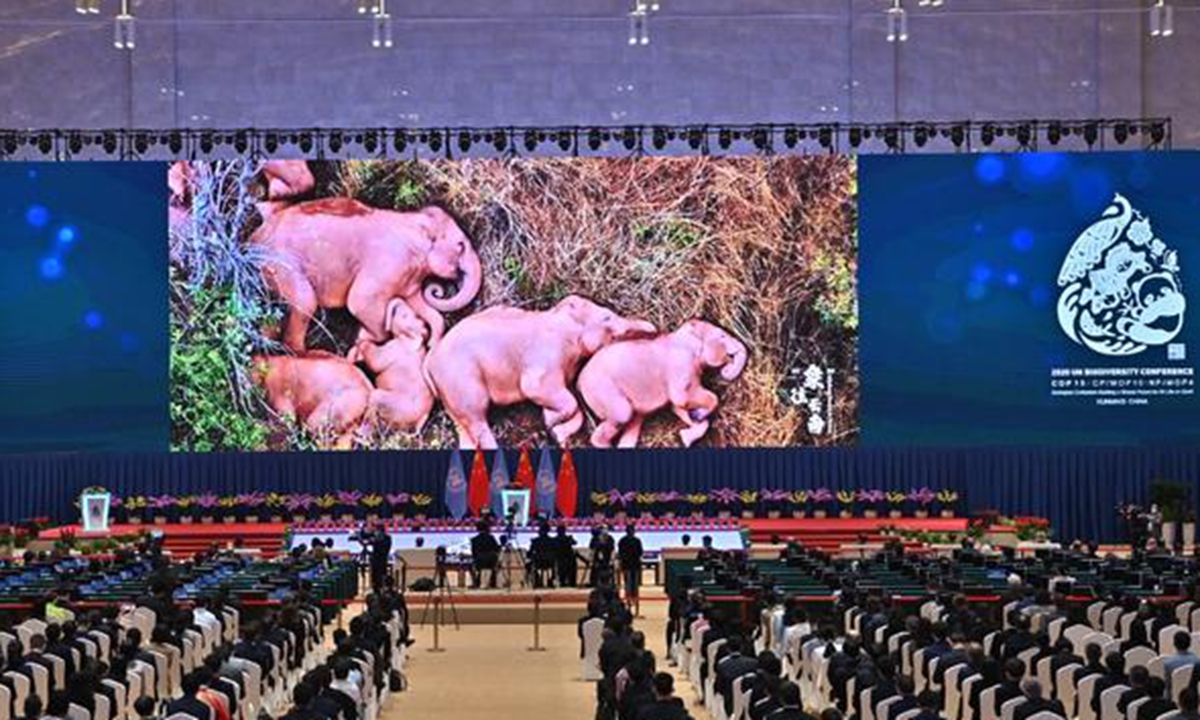
A video on elephants is being played during the opening ceremony of the 15th meeting of the Conference of the Parties to the Convention on Biological Diversity, known as COP15, in Kunming, Yunnan province, on Oct 11, 2021. PHOTO: Xinhua
A document that aims to stop the ongoing biodiversity crisis was adopted on Wednesday in the first segment of the 15th meeting of the Conference of the Parties (COP15) to the United Nations Convention on Biological Diversity. The Kunming Declaration, the newest globally recognized agreement on biological diversity, pledges to "reverse the current loss of biodiversity and ensure that biodiversity is put on a path to recovery by 2030 at the latest, toward the full realization of the 2050 Vision of 'Living in Harmony with Nature.'"It has been almost 30 years since the signing of the Convention on Biological Diversity. The period 2011-20 was "the United Nations Decade on Biodiversity," during which countries and international organizations made great efforts to curb biodiversity losses, but the results were less than satisfactory. The ecosystems that people and other species depend on for living continue to deteriorate. If this trend intensifies, the survival of human beings will become difficult, let alone continued development.
In this context, the Kunming Declaration vows to restore biodiversity by 2030 and ensure the full realization of the 2050 Vision of "Living in Harmony with Nature." The declaration is as significant as the Paris Agreement. It is a milestone in biodiversity conservation. It has set clear-cut goals for countries and pointed out the direction they should jointly work toward. Huang Runqiu, China's minister of ecology and environment, said during the COP15 meeting that the declaration sends a strong signal, showing the world the resolve to halt biodiversity losses. It is expected to provide a political driving force for further consultations.
As one of the first parties to sign and ratify the Convention on Biological Diversity, China attaches great importance to the protection of biodiversity. China has also actively made great efforts to contribute to the global cause of biodiversity conservation.
Chinese President Xi Jinping on Tuesday announced China's initiative to establish the Kunming Biodiversity Fund, which aims to support biodiversity protection in developing countries, and take the lead by investing 1.5 billion yuan ($233 million) to the fund, when he addressed the leaders' summit of the COP15 via video link. This shows China has transformed from a participant in biodiversity governance to an active contributor and even a leader. China now is the second-largest economy in the world and has maintained a good momentum for development. Countries all over the world are watching us. We can be a role model for other countries in biodiversity protection by doing our own job well and assuming due responsibilities as a major power.
International cooperation is direly needed for global environmental protection. But the world's biggest power, the US, is playing a negative role and hindering global joint efforts. The US is the only UN member state that has not ratified the Convention on Biological Diversity. Party politics is one of the important stumbling blocks for ratification. At a critical juncture for biodiversity protection, the absence of the US undermines global efforts in this area. As the US pullout and rejoining of the Paris Agreement shows, when it comes to global environmental issues, the US cares about only its own interests.
We have a long way to go to protect biodiversity and realize the harmonious coexistence of people and nature. Global biodiversity protection cannot be achieved without contributions from all countries, nor can it be realized simply through one country's efforts. In order to realize the goals set in the Kunming Declaration, the international community should make joint efforts to reduce threats to biodiversity, formulate practical and feasible policies and put them into action.
China now has played a leading role in global ecological civilization construction and global environmental governance. China attaches great importance to ecological civilization and has called for actions to promote and build a community for all life on Earth so as to realize harmonious coexistence of people and nature. Facing the global biodiversity crisis, China has offered a China plan and made great contributions.
The author is deputy director of the Beijing Academy of Ecocivilization. opinion@globaltimes.com.cn




